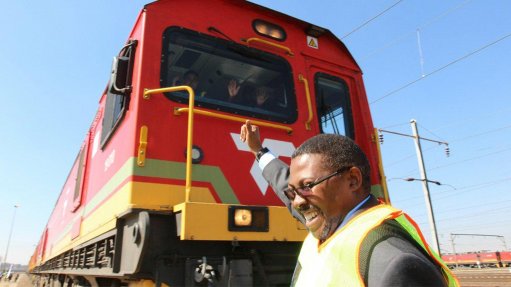
TFR CEO Siyabonga Gama gives Project Shongololo the thumbs up
JOHANNESBURG (miningweekly.com) – South Africa’s State-owned Transnet Freight Rail (TFR) reported on Tuesday that it would introduce a new 200-wagon rail service along its coal export corridor, raising the operation's yearly capacity to above 81-million tons.
Dubbed ‘Project Shongololo’, the service will operate directly between the privately owned Richards Bay Coal Terminal (RBCT), in KwaZulu-Natal, and the coal mines of Mpumalanga, bypassing the Ermelo yard leg to reduce train-handling time. Hitherto, 100 empty wagons have been dispatched from Ermelo to the mines for loading before being returned to the yard for consolidation into 200-wagon trains.
However, TFR stressed in a statement that any ramp-up to 81-million tons in the near term would be dependent on the availability of coal.
During the 2013 financial year, the group moved 69.2-million tons of coal along the export channel, a lower-than-expected increase from the 67.7-million railed in 2012. Softer coal prices reportedly dampened demand, while TFR also experienced operational problems at the Overvaal tunnel.
Under the bigger Transnet group’s R300-billion-plus market demand strategy, the plan is to raise the corridor’s capacity to 97.5-million tons a year by 2020 – well above the RBCT's nominal nameplate capacity of 91-million tons.
Transnet is, thus, also interrogating the prospect of constructing a new open-access coal terminal, which could be developed in phases alongside the miner-owned RBCT.
That said, it is currently uncertain how that export ramp-up proposal gels with State-owned power utility Eskom’s call for coal to be designated a strategic resource to reduce the security-of-supply threat faced by its coal-fired power station fleet from 2018 onwards. The South African government is still finalising its policy in this regard, which could affect the nature of coal mining investment and the future of exports.
TFR CEO Siyabonga Gama says the new approach, which is part of its scheduled-railway philosophy, will reduce cycle times for locomotives from an average of 58 to 41 hours and from 63 to 48 hours for wagons. In addition, it will relieve capacity across its coal logistics system.
In fact, TFR estimates that it is poised to deliver more than two-million tons of coal weekly for domestic and export customers, raising its annualised coal-transport capacity to 96-million tons.
Shongololo project manager Pragasen Pillay says the service will increase weekly railed export coal capacity by 30%, from the current 1.4-million tons, to a potential capacity of 1.85-million tons. “The number of export coal trains a day will increase from 25 to a potential 32 trains. And moving into the fourth quarter of this year, we will see 34 trains a day."
The service will free up slots that can be used to address other domestic demands, such as coal for Eskom’s Majuba power station. Coal stemming from the Waterberg region will also enjoy the benefits of this unlocked potential.
In addition, the de-bottlenecking of Ermelo will allow TFR to run longer general freight trains, which will have positive spin-offs for other minerals sectors such as chrome.
Project Shongololo introduces a new efficient use of technologies, including the concurrent use of wire distributed power and alternating current/direct current traction.